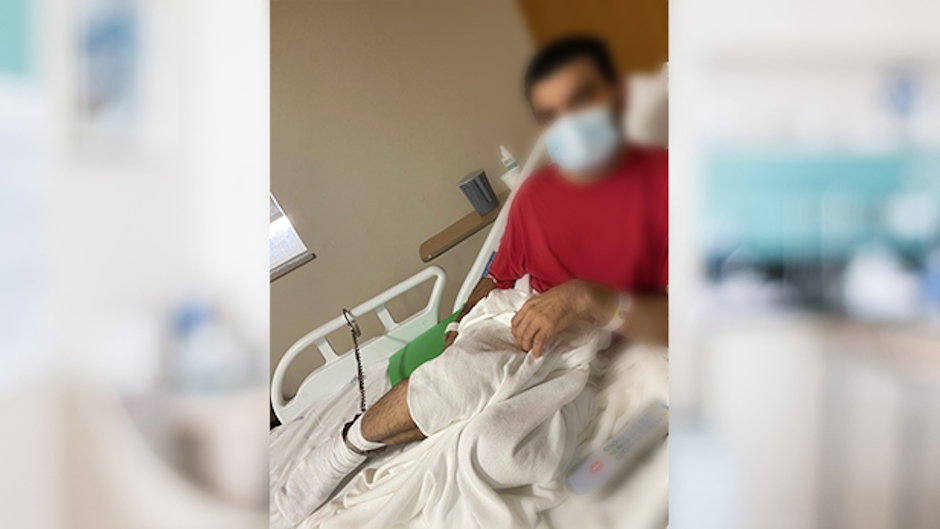A lawsuit filed in April by the Miami Law’s Immigration Clinic seeks release from immigration detention of a 43-year-old father and resident of New Jersey who is exercising his First Amendment right to protest the conditions of his lengthy incarceration with a month-long – and counting – hunger strike. The clinic is also defending their client against a petition by Immigration and Customs Enforcement to strap him down in restraints and force-feed him, a practice forbidden by medical ethics. The client, an asylum seeker from El Salvador, is currently chained to a hospital bed 24 hours a day.
The clinic partnered with the Immigrant Rights Clinic of Rutgers Law Clinic to file a petition for writ of habeas corpus and a complaint for injunctive relief in U.S. District Court in the Southern District of Florida. The petition argues that their client’s 17-month detention violates his constitutional right to due process, considering his physical and mental health conditions as well as the threat to him posed by the COVID-19 pandemic. In the first week of March, the client began a hunger strike — his second — to protest his prolonged immigration detention and the conditions under which he is being held.
Miami Law second-year students Jae Lynn Huckaba, David Mancia-Orellana, and Jose Ortega worked late into the night and weekend to research and prepare the petition.
“The facts of our client’s case are harrowing,” said Ortega. “Not only has ICE subjected him to inhumane detention conditions — forcing him to spend 20 hours a day in a tiny cell where he used books to keep rats from entering under the cell door — but this all occurred during a global pandemic, amplifying the risk to his life.”
Established in the fall of 2009, the Immigration Clinic provides a challenging opportunity for students to advocate on behalf of immigrants in a wide variety of complex immigration proceedings. In addition to helping individual clients, students collaborate with other immigrant rights groups on projects that reform the law and advance the cause of social justice for immigrants.
“Spending over a year locked up without any hope of release would be difficult for anyone,” said Huckaba. “Our client struggles with multiple medical conditions. Yet, despite his high risk of contracting a severe case of COVID-19 and the excessive length of his detention, ICE still refuses to release him. I am incredibly thankful that our clinic shines a light on and challenges these injustices.”
The clinic is dedicated to being an integral part of the wider immigrant and human rights advocacy community in South Florida and the nation and works on a variety of Cases, Projects and Resources including its Haiti Report, Stopping Deportations To Haiti and Resources for Detainees in Immigration Proceedings.
For Mancia-Orellana, this case was personal. “As a native Salvadoran, when I heard our client’s story, it really hit home,” he said. “I had a very busy weekend planned, but after learning that the Government was pushing to end our client’s hunger strike by requesting an order to force-feed, I canceled everything to help in any way I could in preparing his habeas petition.”
The Immigration Clinic fosters a collaborative work environment, providing opportunities for students to work with one another, supervisors, and other practicing attorneys.
Ortega said that given the client’s several transfers, the case provided the students with the unique opportunity to work in concert with attorneys and clinics from different states. The collaboration has been made easier in some ways by the court’s embrace of technology in the wake of the pandemic, such as court hearings over Zoom, he said.
Native Arkansan Huckaba added that it is rare to meet a people from her home state while in South Florida, so it was a pleasant surprise to work with Mancia-Orellana.
Located in South Florida, the clinic works on a wide variety of complex cases and advocates on behalf of immigrants from across the globe. This case offered a unique opportunity to the students, allowing them to help draft a habeas petition for the first time.
“The Miami Law Immigration Clinic has a reputation for student involvement,” said Huckaba. “As a prospective student, I was drawn to Miami Law because of the Immigration Clinic’s student advocacy.”
Mancia-Orellana added that the petition “required a lot of heavy lifting. But in the end, the experience was amazing. We had a great team working around the clock to have the petition ready by Monday morning. Seeing the end product was very fulfilling.
“People are people,” he said. “It is inhumane for ICE to subject vulnerable immigrants like our client to prolonged detention without a bond in facilities that do not comply with COVID-19 protocols. Our client’s case shines a bright light on ICE’s questionable practice.”
Read more about Miami Law’s Immigration Clinic

